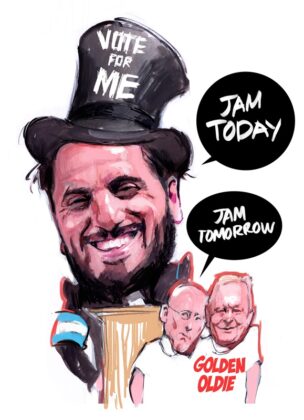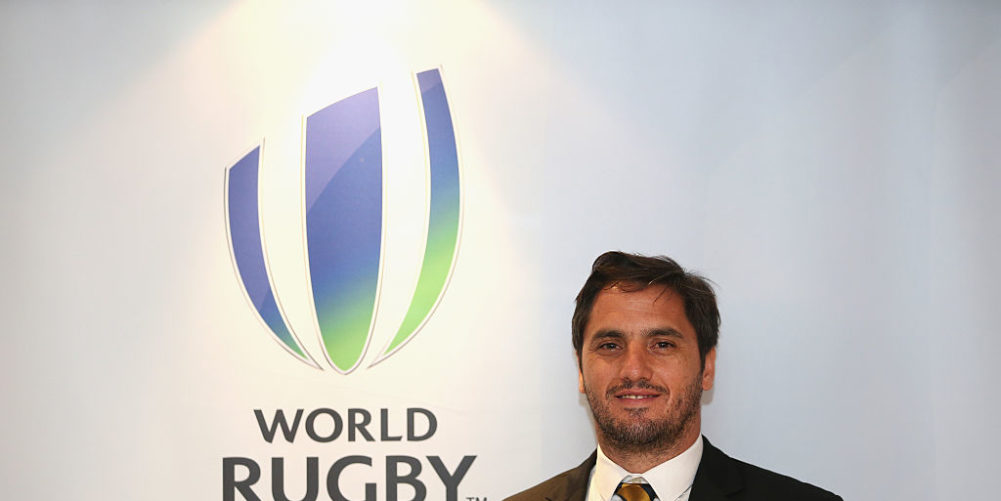AGUSTIN Pichot and Bernard Laporte are peas out of the same pod, and not just because they are both ex-scrum-halves, the former a captain of Argentina and the latter a coach of France.
Pichot and Laporte are also both politicians, and they covet Bill Beaumont’s post as chairman of World Rugby.
Pichot’s challenge is the more pressing because last week, he decided to go head-to-head with Beaumont in a late bid to oust him in the World Rugby election for chairman at the end of this month.
Meanwhile, French Federation president Laporte is playing the longer game as Beaumont’s running mate for the vice-chairman post that Pichot holds currently. Former England captain Beaumont is seeking a second four-year term, and Laporte’s end-game is to take over from Beaumont – should he be successful – four years from now.
The announcement of Pichot’s candidacy was greeted with a fanfare of support, which saw him hailed in some quarters as an energetic, relatively young (45), progressive who could become the saviour of the game by shaking up the old order of established rugby nations.
His main target is the northern hemisphere’s Six Nations block, which is seen in some quarters as putting a brake on the game’s progress. England, France, Wales, Scotland, Ireland, and Italy have been portrayed by Pichot as a protectionist ‘old boys club’ which is ‘holding the game back’.
The 68-year-old Beaumont has been represented as a conservative establishment figure who will preserve the status quo.
Beaumont has bridled at being typecast, not least when his old England team-mate, Sir Clive Woodward, threw his weight behind Pichot’s campaign.
Woodward, who described the Argentine as ‘a visionary’ with great energy, brought age into the arena, suggesting that rugby would benefit from being seen, ‘through the eyes of a leader who is 45 not 68′.
Beaumont responded: “What difference does age make?” He added that just because he played rugby as an amateur does not mean he cannot understand the professional game.
What is interesting about Pichot’s manifesto is the ‘all things to all men’ hallmark of the Peronist politicians he has been closely associated with in Argentina – a country which, despite numerous Peronist governments, has suffered from chronic economic instability for decades.
There will be elements in his six-point plan that will jar with the European game, among them the suggestion that the international window accommodates an annual tournament featuring 12 to 14 Tests a year. English and French clubs will not take kindly to proposals that sees them lose their international players for longer periods.

The same is true of the Six Nations unions like England, Wales, Scotland and Ireland, who have spent multi-millions on developing their own national grounds. Seeing that revenue shared with southern hemisphere unions, and some of the smaller nations, is part of Pichot’s agenda. His promise also embraces bringing a democratised, gender equal, progressive, commercially viable dynamic into the game, which, while it is long on rhetoric, is short on detail.
His manifesto exhorts: “Women and men, we all fight for, and believe in a fair, equal and more inclusive world. Do we? If so let’s make these dreams a reality for this sport.”
Pichot’s vice-chairmanship of World Rugby has had its controversies, not least in 2018, when the Rugby Australia board member, Brett Robinson, confronted him about his relationship with the Australian mining billionaire, Andrew Forrest.
This was because Forrest, as well as developing the rebel World Series Rugby competition after his Western Force franchise had been excluded from Super Rugby, appointed Pichot as a director of one of his Argentine mining interests, Fortescue South America.
This was seen by leading Australian administrators as a potential conflict-of-interest for Pichot, who is also owner of a film production company which has worked with ESPN South America.
However, it seems to have been put aside for the moment, following strong suggestions that the former Pumas skipper will get the support of not just the cash-strapped Australians, but also the rest of the SANZAAR block.
The South Africans, who are still seething over Laporte’s torpedoing of their 2023 World Cup bid, are considered certainties to back Pichot, as are New Zealand, for whom revenue sharing with European nations is high on the agenda.
Laporte, who was French sports minister during Nicolas Sarkozy’s presidency, has also been embroiled in a conflict of interest investigation.
This centred on allegations that the French Federation president had favoured reduced sanctions on Top 14 side Montpellier, who are owned by billionaire businessman Mohad Altrad, with whom Laporte’s company, BL Communication, had negotiations.
Laporte was cleared of any wrongdoing, but Altrad, who supported France’s 2023 World Cup bid, was able to secure shirt sponsorship rights for the French team in a five-year, €35m deal.
These episodes spell out very clearly to World Rugby that it needs to ensure that any employment contracts among its senior officials strictly prohibit any conflicts of interests.
As for the election, it is predicted that the battle between Beaumont and Pichot will be a close-run thing, with the incumbent chairman holding the northern hemisphere caucus and Pichot the southern hemisphere block.
NICK CAIN























